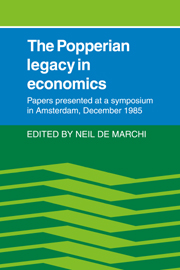Book contents
- Frontmatter
- Contents
- Preface
- List of contributors
- Introduction
- Discussion
- Part I Popper as a philosopher of science
- Part II Popper among the economists
- 3 Ad hocness in economics and the Popperian tradition
- 4 Popper and the LSE economists
- Part III Falsification and trying to do without it
- Part IV The missing chapter: empirical work and its appraisal
- Part V Non-Popperian perspectives on economics
- Index
4 - Popper and the LSE economists
Published online by Cambridge University Press: 05 January 2012
- Frontmatter
- Contents
- Preface
- List of contributors
- Introduction
- Discussion
- Part I Popper as a philosopher of science
- Part II Popper among the economists
- 3 Ad hocness in economics and the Popperian tradition
- 4 Popper and the LSE economists
- Part III Falsification and trying to do without it
- Part IV The missing chapter: empirical work and its appraisal
- Part V Non-Popperian perspectives on economics
- Index
Summary
The usual student about to embark on a dissertation in economics is advised to find a tractable problem, produce a model, and test its implications in ways that shed light on the problem. It is accepted that data of the right sort are hard to find and yield only to trained pummeling (or caressing). Many compromises and judgments insert themselves between the theoretical and the empirical model ultimately adopted. Tests therefore are rarely satisfying and never conclusive, and the student learns to make do with conclusions as reticent as “The results do not warrant rejection of the hypothesis.”
All of this is pretty much common wisdom. Testing is what we aspire to, and we think we know what it means to test. A mere thirty years ago, however, things were not so clear. Then, both the techniques and the methodology of testing were quite new. In 1955 there were just three texts in econometric methods available in English–Tinbergen (1951), Tintner (1952), and Klein (1953)–and Friedman's essay espousing the testing of theory by checking its predictions was just two years old. Calculating technology, too, was very primitive for the majority. As an undergraduate I cranked out calculations on hand-operated Facit machines, and anything beyond a simple linear regression was unthinkable.
From the side of economic theory, too, there was a serious snag, although it is doubtful whether it was more than vaguely sensed by many.
- Type
- Chapter
- Information
- The Popperian Legacy in EconomicsPapers Presented at a Symposium in Amsterdam, December 1985, pp. 139 - 166Publisher: Cambridge University PressPrint publication year: 1988
- 17
- Cited by



